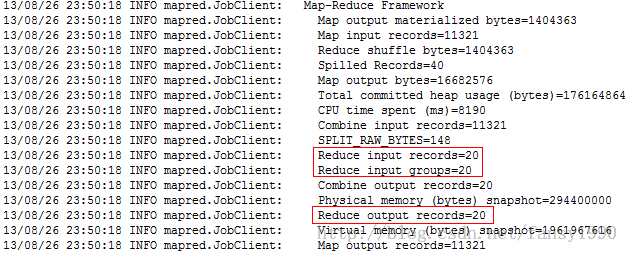Twenty Newsgroups Classification实例任务之TrainNaiveBayesJob(一)
接着上篇blog,继续看log里面的信息如下:
+ echo 'Training Naive Bayes model' Training Naive Bayes model + ./bin/mahout trainnb -i /home/mahout/mahout-work-mahout/20news-train-vectors -el -o /home/mahout/mahout-work-mahout/model -li /home/mahout/mahout-work-mahout/labelindex -ow
这里mahout的trainnb对应的源码文件是TrainNaiveBayesJob类,该类主要的工作是:(1)新建了一个LabelIndex的文件;(2)执行了一个prepareJob,Mapper和Reducer分别是:IndexInstancesMapper、VectorSumReducer;(2)执行了另外的一个prepareJob,Mapper和Reducer分别是:WeightsMapper、VectorSumReducer;本篇主要分析前面两个工作。
新建LabelIndex的代码如下:
private long createLabelIndex(Path labPath) throws IOException {
long labelSize = 0;
if (hasOption(LABELS)) {
Iterable<String> labels = Splitter.on(",").split(getOption(LABELS));
labelSize = BayesUtils.writeLabelIndex(getConf(), labels, labPath);
} else if (hasOption(EXTRACT_LABELS)) {
SequenceFileDirIterable<Text, IntWritable> iterable =
new SequenceFileDirIterable<Text, IntWritable>(getInputPath(), PathType.LIST, PathFilters.logsCRCFilter(), getConf());
labelSize = BayesUtils.writeLabelIndex(getConf(), labPath, iterable);
}
return labelSize;
}
这里的主要工作是把相关的文件名转换为数字,文件名如下图:

下面看Mapper,IndexInstancesMapper的主要代码如下:
labelIndex = BayesUtils.readIndexFromCache(ctx.getConfiguration());
String label = labelText.toString().split("/")[1];
if (labelIndex.containsKey(label)) {
ctx.write(new IntWritable(labelIndex.get(label)), instance);
首先在setup函数中读取labelindex的map映射关系,然后在map中针对输入/alt.atheism/51060解析/后面的字符串,即文件名进行匹配,输出对应的数字和相应的value不变;
VectorSumReducer:
Vector vector = null;
for (VectorWritable v : values) {
if (vector == null) {
vector = v.get();
} else {
vector.assign(v.get(), Functions.PLUS);
}
}
ctx.write(key, new VectorWritable(vector));
上面的代码就是把相同的文件对应的word的单词的个数全部加起来,由于一共有20个文件,所以这里的reduce输出应该有20个,对应log里面的信息,可以看到确实匹配,如下图:

这里额可以通过下面的代码来测试相关的文件:
package mahout.fansy.test.bayes.read;
import java.io.IOException;
import java.net.URI;
import java.util.HashMap;
import java.util.Map;
import org.apache.hadoop.conf.Configuration;
import org.apache.hadoop.fs.FileSystem;
import org.apache.hadoop.fs.Path;
import org.apache.hadoop.io.IOUtils;
import org.apache.hadoop.io.IntWritable;
import org.apache.hadoop.io.SequenceFile;
import org.apache.hadoop.io.Text;
import org.apache.hadoop.io.Writable;
import org.apache.hadoop.util.ReflectionUtils;
import org.apache.mahout.math.VectorWritable;
public class ReadLabelIndex {
/**
* @param args
*/
public static Configuration conf=new Configuration();
static String fPath="";
static String trainPath="";
static{
conf.set("mapred.job.tracker", "ubuntu:9001");
fPath="hdfs://ubuntu:9000/home/mahout/mahout-work-mahout/labelindex"; // lableindex 数据文件
trainPath="hdfs://ubuntu:9000/home/mahout/mahout-work-mahout/"
+"20news-train-vectors/part-r-00000"; // 训练样本数据
}
public static void main(String[] args) throws IOException {
// readFromFile(fPath);
readFromFile(trainPath);
}
/**
* 读取LabelIndex文件
* @param fPath
* @return
* @throws IOException
*/
public static Map<Writable,Writable> readFromFile(String fPath) throws IOException{
FileSystem fs = FileSystem.get(URI.create(fPath), conf);
Path path = new Path(fPath);
Map<Writable,Writable> map=new HashMap<Writable,Writable>();
SequenceFile.Reader reader = null;
try {
reader = new SequenceFile.Reader(fs, path, conf);
Writable key = (Writable)
ReflectionUtils.newInstance(reader.getKeyClass(), conf);
Writable value = (Writable)
ReflectionUtils.newInstance(reader.getValueClass(), conf);
while (reader.next(key, value)) {
// Writable k=; // 如何实现Writable的深度复制?
// map.put(key, value);
System.out.println(key.toString()+", "+value.toString());
System.exit(-1);// 只打印第一条记录
}
} finally {
IOUtils.closeStream(reader);
}
return map;
}
}
这里在写的时候想做一个通用的,所以需要对Writable深度复制,但是一时间还没有想到办法,所以这里留个问题,有时间解决。
分享,成长,快乐
转载请注明blog地址:http://blog.csdn.net/fansy1990